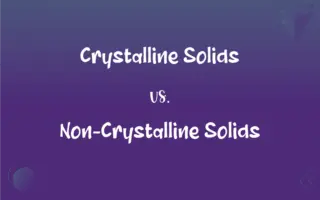Dug Well vs. Bore Well: What's the Difference?
Edited by Aimie Carlson || By Janet White || Published on March 6, 2024
Dug Well is a large diameter well, typically shallow and manually excavated. Bore Well is a narrow, often deep well, created using mechanized drilling.

Key Differences
A dug well is traditionally excavated by hand, creating a wide opening, and is usually less deep. It often accesses groundwater from shallower sources. In contrast, a bore well is drilled mechanically, resulting in a much narrower well that can reach greater depths, tapping into deeper groundwater levels.
Dug wells are constructed by manual labor, using tools like shovels and require lining with stones, bricks, or concrete to prevent collapse. Bore wells, on the other hand, are constructed using advanced drilling equipment, which can easily penetrate through hard rock layers.
Dug wells typically have a lower yield and are more susceptible to contamination due to their shallow nature and larger opening. Bore wells, being deeper, generally yield more water and have a lower risk of contamination, as the water is sourced from deeper, often purer layers.
Dug wells require more maintenance due to their susceptibility to silting, contamination, and structural collapse. Bore wells, while more durable and less prone to contamination, can face issues like blockage or pump failure at greater depths.
Constructing a dug well is generally less expensive but labor-intensive and limited by terrain. Bore wells, though more costly due to the need for specialized equipment, can be constructed in a variety of terrains and reach water sources unavailable to dug wells.
ADVERTISEMENT
Comparison Chart
Diameter
Wide
Narrow
Depth
Shallow
Deep
Construction
Manual labor, simpler tools
Mechanized drilling
Water Source
Shallower groundwater
Deeper groundwater
Contamination Risk
Higher
Lower
ADVERTISEMENT
Cost
Generally lower, labor-intensive
Higher due to equipment
Dug Well and Bore Well Definitions
Dug Well
A water source dug out from the earth, usually in rural areas.
They found clean drinking water in the newly dug well.
Bore Well
A mechanically drilled well reaching deep aquifers.
The bore well provided access to pristine groundwater.
Dug Well
A shallow well for accessing near-surface groundwater.
The farmer relied on a dug well for irrigating his crops.
Bore Well
A modern solution for accessing deep underground water sources.
The new bore well solved the village's water scarcity issues.
Dug Well
An open well created by traditional digging methods.
The village's main water source was a centuries-old dug well.
Bore Well
A high-depth well created using advanced drilling techniques.
Due to drought, they had to drill a bore well for water.
Dug Well
A manually made well often lined with stones or bricks.
The dug well was reinforced with bricks to prevent collapse.
Bore Well
A deep, narrow well drilled into the ground.
They installed a pump in the bore well for consistent water supply.
Dug Well
A manually excavated, wide water well.
They used buckets to draw water from the old dug well.
Bore Well
A tube well with a small diameter but significant depth.
Their bore well was over 100 feet deep.
FAQs
Are bore wells more expensive than dug wells?
Yes, bore wells typically require more investment due to the need for drilling equipment.
Can a dug well be converted into a bore well?
Technically, yes, but it involves extensive drilling and modifications.
How is a bore well different from a dug well?
A bore well is a mechanically drilled, narrow, and deep well, contrasting with the wider, shallower, manually dug wells.
How long does it take to construct a bore well?
It varies, but bore wells can be drilled in a few days to weeks, depending on depth and terrain.
Which type of well is more prone to contamination?
Dug wells are more prone to contamination due to their shallow depth and wider opening.
Can both wells be used in urban areas?
Bore wells are more commonly used in urban areas due to space and depth constraints, whereas dug wells are less common.
What is a dug well?
A dug well is a manually excavated, typically shallow well, often used in rural areas for accessing groundwater.
Can bore wells access deeper water sources than dug wells?
Yes, bore wells can reach deeper aquifers that are not accessible by dug wells.
Are there legal regulations for drilling bore wells?
Yes, many regions require permits and follow regulations for drilling bore wells.
What maintenance does a dug well require?
Dug wells require regular cleaning, desilting, and checks for structural integrity.
What are the signs of a failing bore well?
Reduced water yield and changes in water quality can indicate issues.
How do environmental factors affect these wells?
Environmental factors like pollution, land use, and climate can affect both well types, but dug wells are more vulnerable.
What is the lifespan of a dug well?
With proper maintenance, a dug well can last several decades.
How does seasonal variation affect these wells?
Water levels in both wells can fluctuate with seasons, affecting availability.
Is the water quality better in bore wells?
Generally, yes, as they access deeper, less contaminated water sources.
Can both types of wells dry up?
Yes, both can dry up if the groundwater level drops significantly.
Can both wells be used for irrigation?
Yes, but the suitability depends on the water yield and quality.
Do bore wells affect the groundwater level?
Excessive drilling of bore wells can lead to a decline in groundwater levels.
Is it safe to drink water directly from these wells?
Water quality testing is recommended before consumption, especially for dug wells.
How deep can a dug well be?
Dug wells are typically up to 30 feet deep, but depths can vary.
About Author
Written by
Janet WhiteJanet White has been an esteemed writer and blogger for Difference Wiki. Holding a Master's degree in Science and Medical Journalism from the prestigious Boston University, she has consistently demonstrated her expertise and passion for her field. When she's not immersed in her work, Janet relishes her time exercising, delving into a good book, and cherishing moments with friends and family.
Edited by
Aimie CarlsonAimie Carlson, holding a master's degree in English literature, is a fervent English language enthusiast. She lends her writing talents to Difference Wiki, a prominent website that specializes in comparisons, offering readers insightful analyses that both captivate and inform.































































